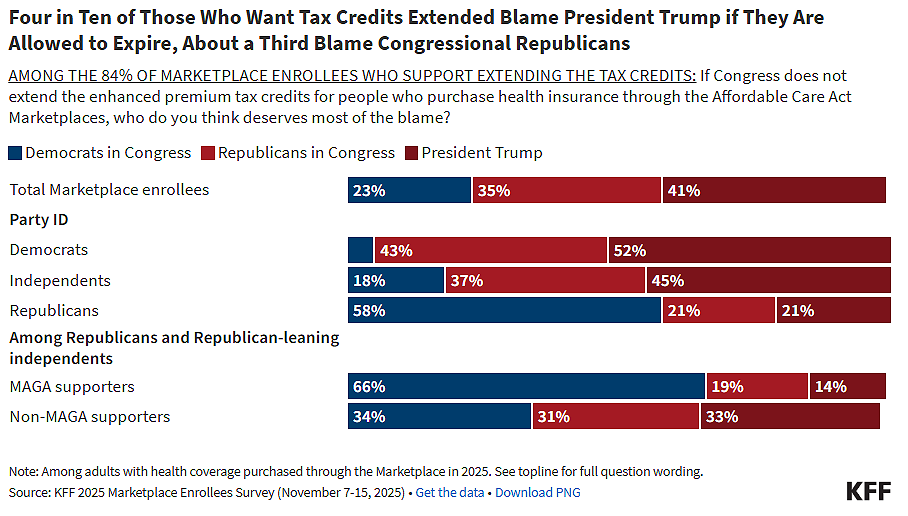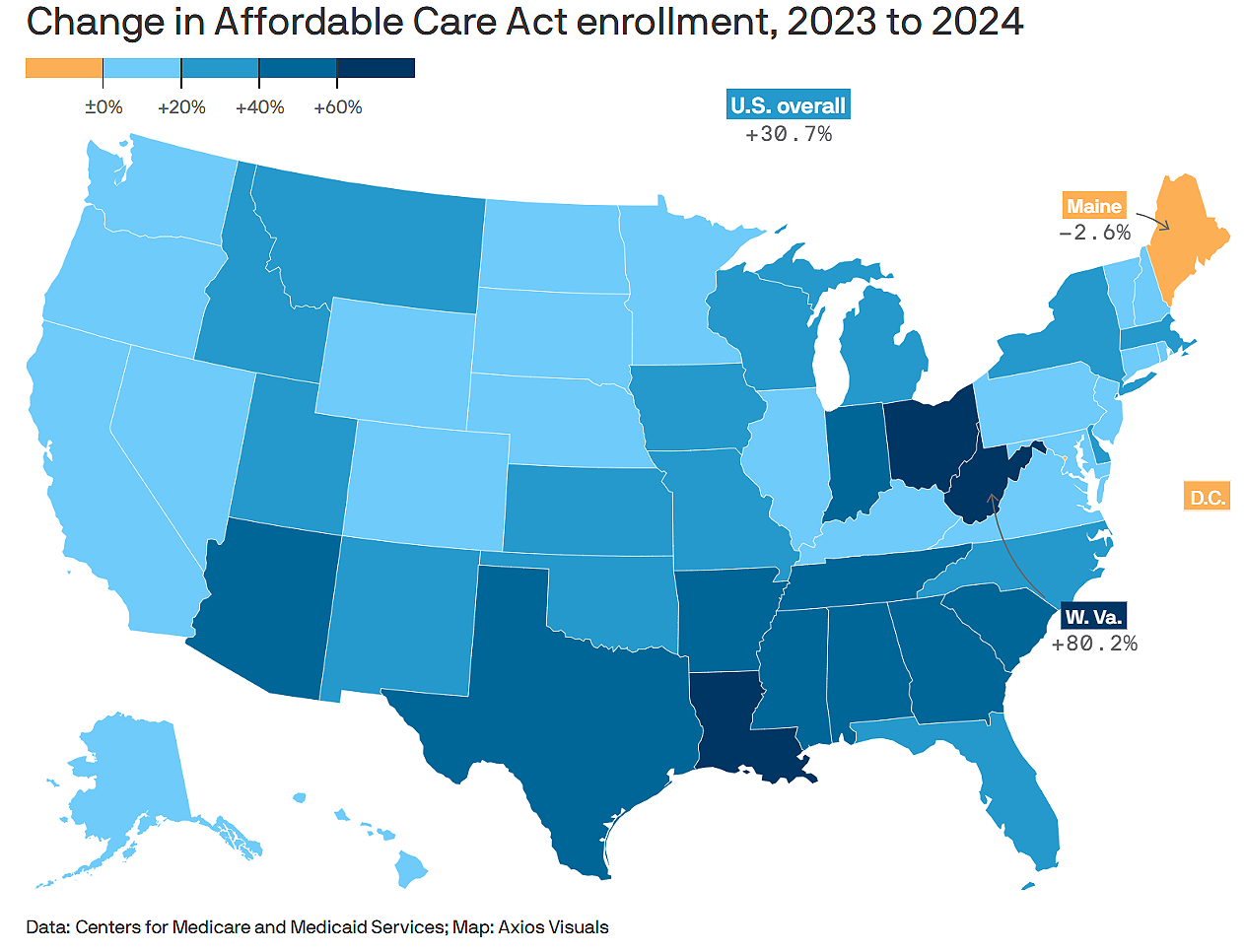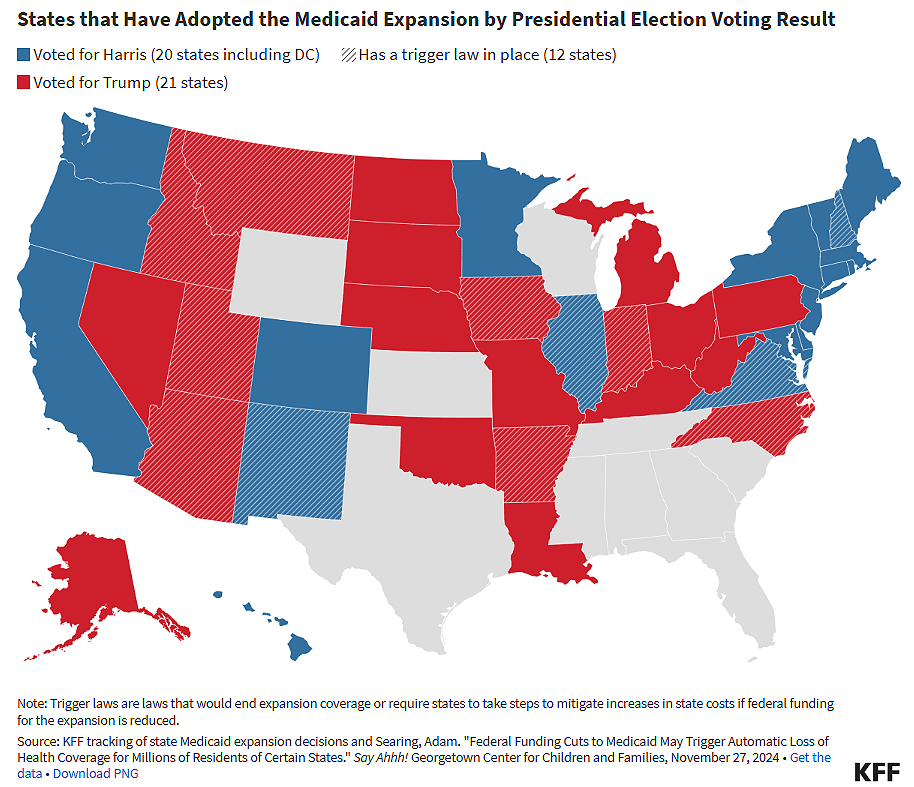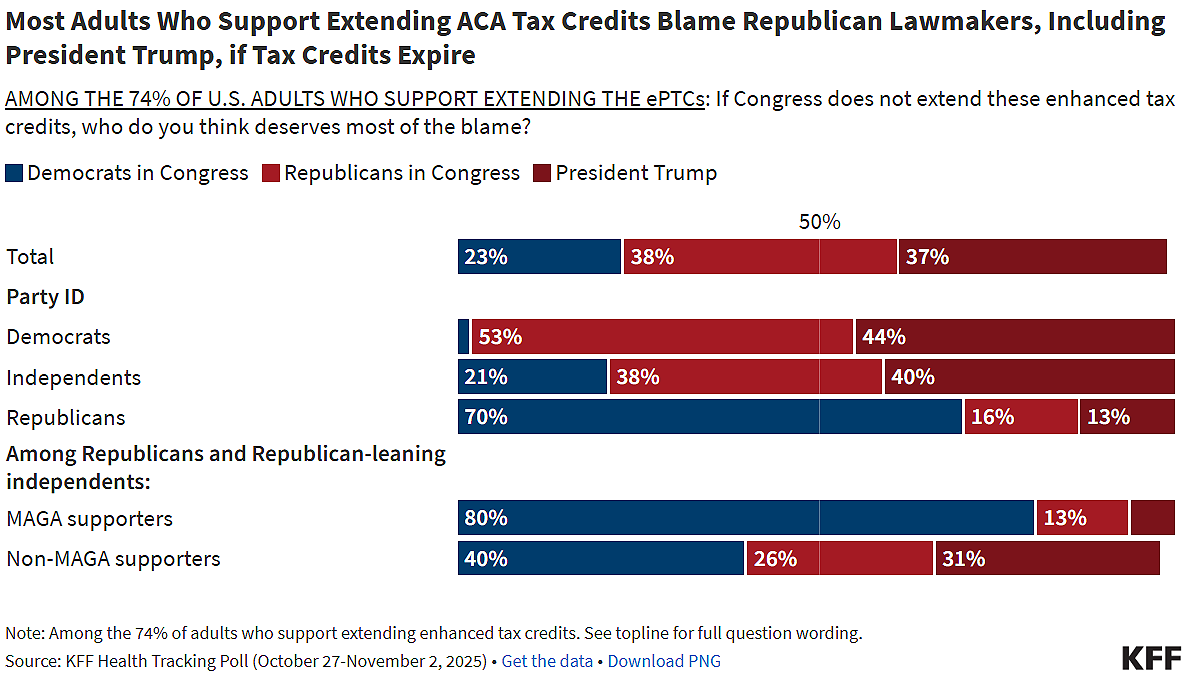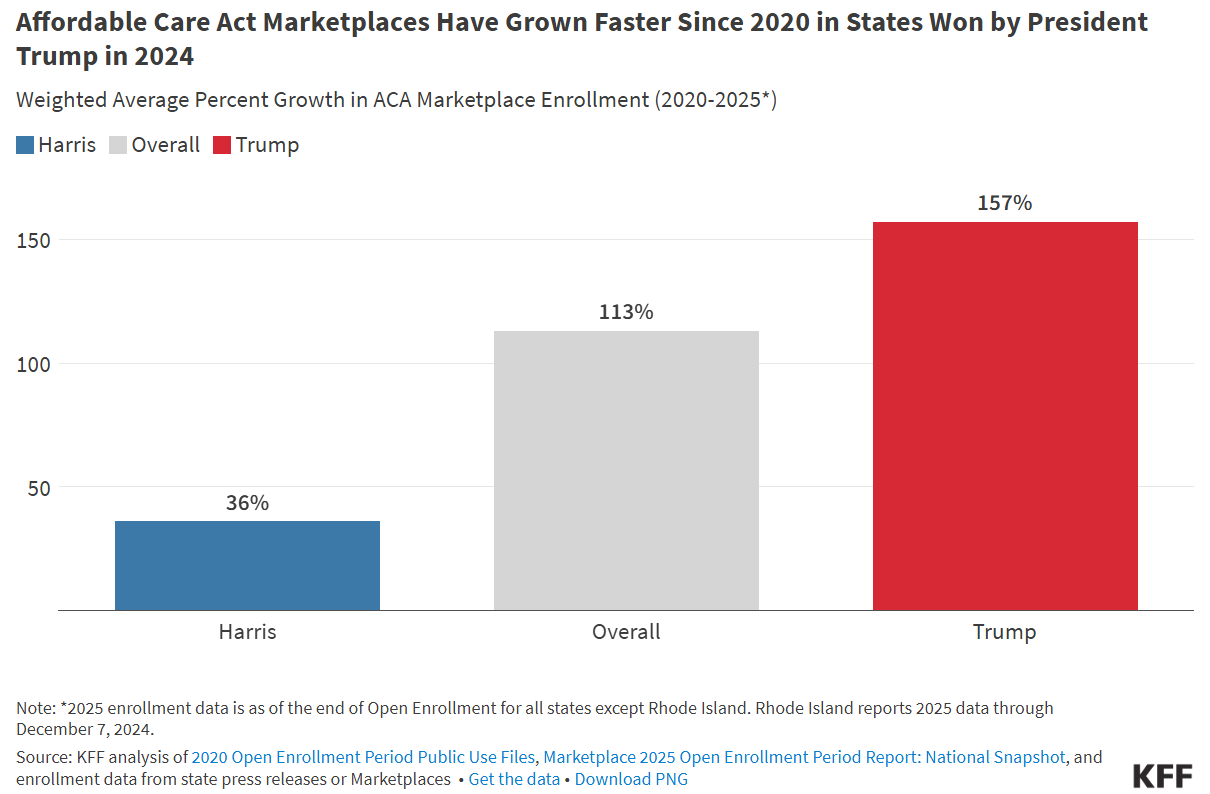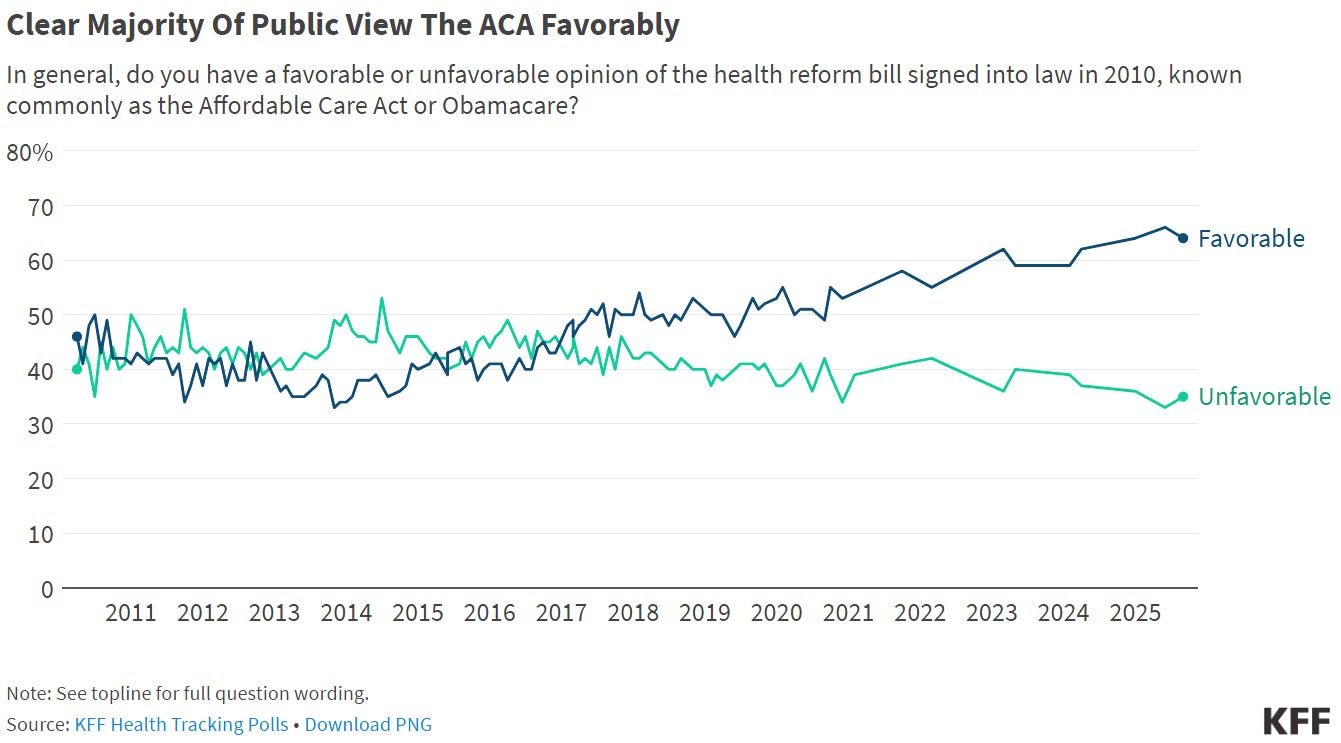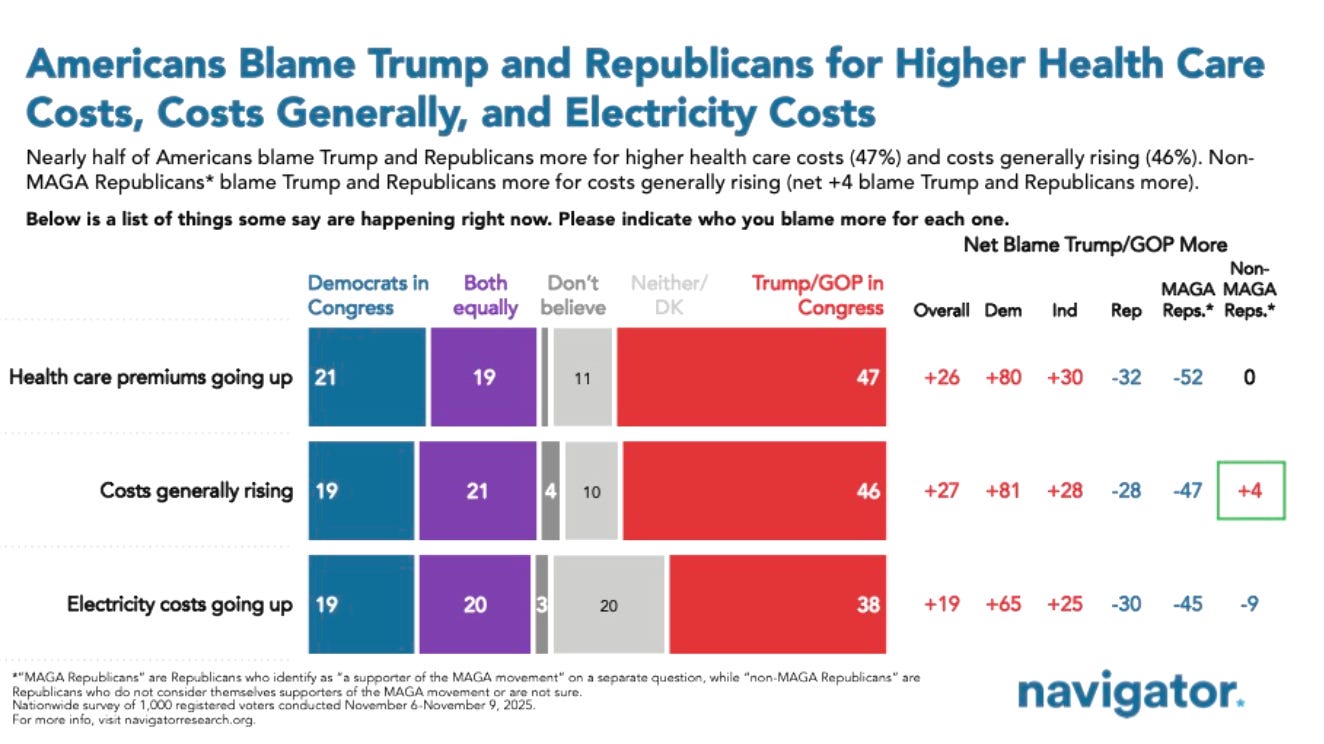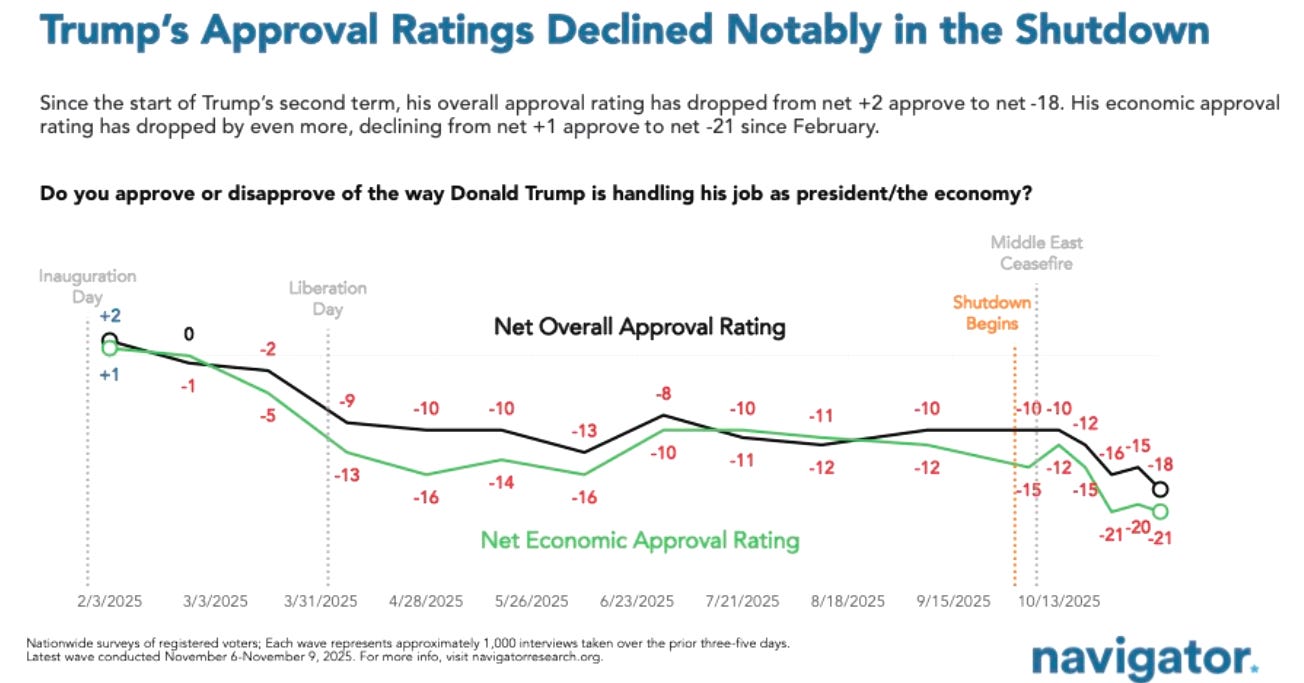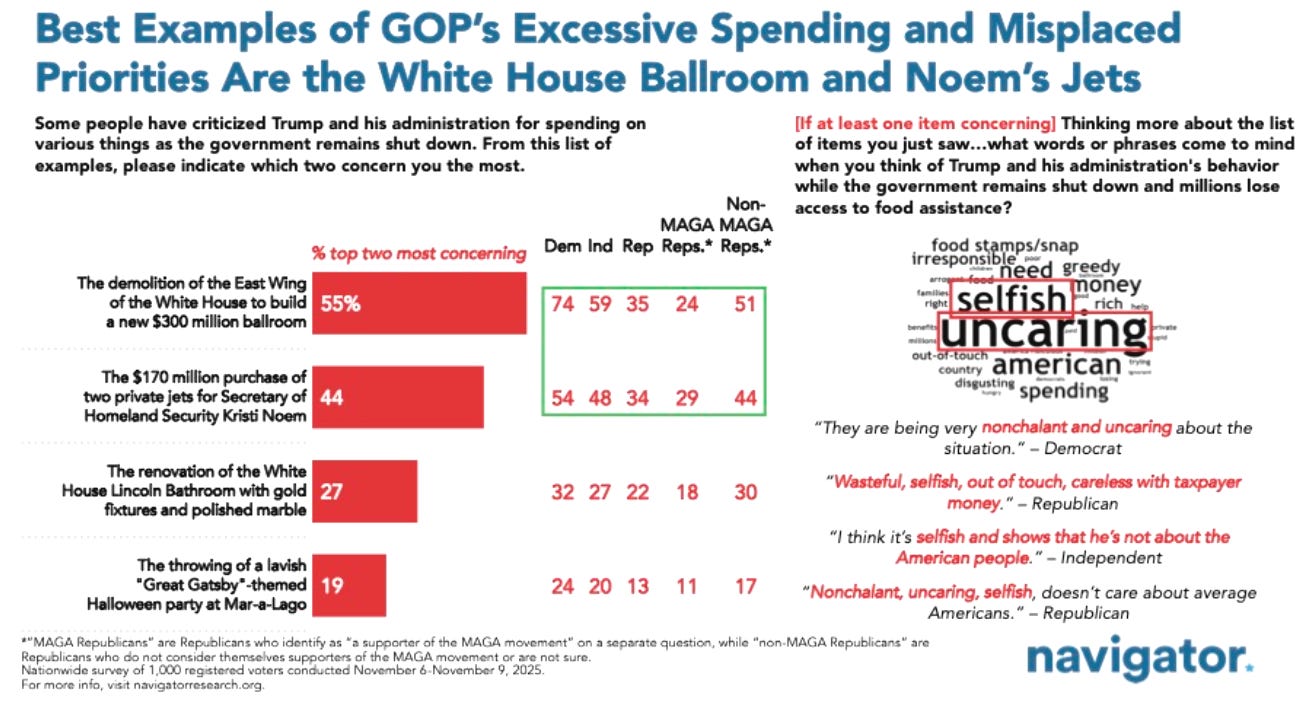The issue that won't go away, even if they did.
Update Dec 19: Gone on (another) vacay—what ACA subsidies? But it will show up again in 2026, thanks rising costs for everyone. And how brokers roiled the subsidy debate by gaming the system.
Update 12-19
They’ve all gone home, tails tucked, avoiding the double debacle of the ACA and the Epstein release. Read below, though, to see how 4 House Republicans staged a revolt to get a subsidy vote in January. Here’s how the end of ACA subsidies could affect you. Finally, WaPo has a piece on how insurance brokers gamed the system, roiling the debate. (Surprised? Not.)
Update 12-18:
As expected, a vote on extending the ACA subsidies this year is rapidly swirling down the drain. But it’s definitely not business as usual. In what media consensus calls a “stunning” move, four Rs in the House joined with Ds to force [yet another leadership-defying] discharge petition to get a—vote vote on subsidies in January after Johnson brought forth a subsidies-free ‘healthcare’ bill. Even R senators aren’t happy with Johnson’s hardline approach. The move means the House is required to vote on the measure, although almost certainly not until January. Johson’s bill is DOA in the Senate, and a bipartisan group of House and Senate lawmakers met this morning to begin exploring a compromise.
Don’t make the mistake of thinking the discharge petition is an isolated event. The “revolt” rocked the establishment, but that’s on top of Susie Wiles’ [superficially disingenuous] 11 hours of Vanity Fair interviews (keeping in mind Wiles is anything but naive), news that 10% of Congress plans to bail in 2026, Jack Smith testifying this week he had proof beyond a reasonable doubt that Trump conspired to overturn the 2020 election, Bongino (and rumored others) emptying his office this week ahead of a January-of-course-not-Epstein-files retirement, all on top of Epstein Files Release D-Day—tomorrow. Even an attempt at Congressionally-unauthorized warring—historically a great way to rouse the nation behind the administration and boost the economy—hasn’t diverted attention. Trump’s plan from last night is very simple: It’s Biden’s fault. Do a Google search (or read anything from The Bulwark substack or many others) and you’ll see the phrase “25th Amendment” is trending. 1,129 days left. Buckle up.
Update 12-16:
“I am p‑‑‑ed for the American people. This is absolute bulls‑‑‑-,” Rep. Mike Lawler (R-N.Y.) thoughtfully articulated. “The idea [of a subsidy fix] just seemed to dawn on leadership … like, in December,” Rep. Kevin Kiley (R-CA) piled on. piled—on
And, yah, that’s pretty much what it looks like on the outside, too.
The deadline was Monday for people on ACA plans who want to enroll in coverage that begins Jan. 1. For plans beginning Feb. 1, the deadline is Jan. 15 and Rs in Congress appear as broken as usual.
A couple of ideas are still reverberating around like 22 cal bullets inside an otherwise empty skull. 20 senators met Monday night at the invitation of Sen. Susan Collins (R-ME AKA zzzzz). “It’s perilously close to something called legislating, which used to be common in the Senate and hasn’t been in a long time,” Dick Durbin (D-IL) says. And vulnerable House reps screamed some more at Johnson on Tuesday. No word yet from Trump on the subsidies, and media are openly noting his… umm…engagement “might be unproductive.” In the meantime, Trump doesn’t seem happy about anything, particulary his SCOTUS request for divine intervention on tariffs and Susie Wiles’ remarkably unwily Vanity Fair interview has multiple WH “junkyard dog” brains smoking. Finish up your gift list; we’ll keep watching Congressional Rs for signs of subsidy life. Breath holding unwise.
Update 12-14:
After the Senate came away empty, increasingly restive and vulnerable House members came up with a subsidy-free proposal they’ll try to launch this week. Red states like ground-zero FL will be hit hard by cost increases, and Congress is already worried about another shutdown in January over the subsidies. A huge new PRC poll (N=10,000+) indicates 2/3 of Americans say it’s the federal government’s responsibility to make sure all Americans have healthcare coverage in addition to another quarter saying both Medicaid and Medicare should be continued. Only 7% said the government shouldn’t be in the healthcare business. (Apparently if we call it something like Ensure Care, it’s not socialism, and we need it yesterday.) Another survey shows a third of Americans had trouble paying for health needs last year. Trump remains hands-off (because there is no problem), a growing problem for Rs. But behold! In the spirit of governing and Christmas or something, Trump now says he’s open to working with Ds: “What a nice group of Democrats. I think we’re going to start working together on health care.” Ds, of course have full faith and trust in that. /S And now Cassidy is muttering about another possible deal. Stay tuned.
Update 12-13:
As expected, it was same-old in the Senate, with dueling votes that went nowhere (see more below). In an overview of the underlying GOP issues, the WSJ notes, “Republicans are caught between the belief among many GOP lawmakers that markets, rather than expensive government programs, should play the leading role in providing coverage and the fact that many GOP voters have come to rely on coverage from the law, often called Obamacare.” With only 5 working days left, vulnerable and increasing rebellious House members are designing…something. Read more about the emerging House proposal here. And of course, the House couldn’t talk about the going to the theatre without bringing up abortion, so it’s in play on this as well.
Update 12-12:
As expected, both the R and D Senate proposals failed Dec. 11, with a vote of 51-48 for each; 60 votes were required for passage. Predictable posturing on both sides followed. KFF polls continue to show broad support (75%) for the subsidies. Given there are only 6 days until Congress recesses again, the likelihood of anything else happening is low, with massive hikes taking place on Jan 1. In the House, a bipartisan group launched a long-shot effort at a compromise bill. Stay tuned on that.
Update 12-11:
The senate is expected to vote on dueling R and D proposals today, with both likely to fail. Watch live on PBS or CSPAN. In the meantime, restive House members on both sides of the aisle are working on a bill that extends the subsidies for two years with new income limits and antifraud measures—and, as we’re seeing increasingly, talking about using discharge petitions to get around Johnson. There may also be some cracks in D unity on the 3-year extension.
Upddate 12-10:
Senate votes are likely this week on dueling proposals, neither likely to pass. Senate Rs are solidifying behind a Cassidy/Crapo HSA-lite approach kinda-supported by Trump; here’s the Cassidy/Crapo happy-happy announcement. (The nation has been there, and it doesn’t work for non-millionaires although many would likely find cash appealing just before major gift-giving holidays and unpaid bills—never mind cash would likely never see an HSA account.1 Vulnerable senators aren’t happy with any of it. Senate Ds are staying focused on 3 year extension, and so far, it looks like they will win politically, pass or fail. The House in the meantime is bringing a ‘real’ healthcare solution (after only 15 years!) to the floor next week that ignores the subsidies. In the meantime, with 41% of ACA enrollees blaming him and another 35% blaming Rs, Trump is throwing Congress under the bus prophylactically with “It’s their decision.”
Update 12-8:
WSJ says some Rs are panicking; we’ll see if that holds water. With only 9 days left to their next vaca, some kind of voting in Senate and/or House is possible this week. Ds built in a requirement for a Senate vote when they agreed to end the Shutdown, and see whatever happens as a political win: If the subsidies get extended, millions of Americans get lower healthcare costs. If the subsidies don’t get extended, Ds plan on riding a lot of anger into the midterms. Polls continue to show that anger is aimed at Rs, and. Sen. Josh Hawley (R-MO) alone says a half million people in his state are affected.
Dems have their version: extend the subsidies for three years, which the R-leaning CRFB says will add $300B to the deficit. Senate Rs are pushing either an extension of subsidies with limitations or a high-deductible HSA-augmented option. The problem with the latter is that, unlike the multi-millionaires writing that version, people who qualify for ACA are lower income, which means they’re very unlikely to be able to put away enough in an HSA to deal with even a low-level problem 4-digit surgery cost, let alone 5-digits for something more serious. Meanwhile, still luring is the issue of some Rs wanting every bill about anything to include more abortion restrictions. More on that and the HSA idea below.
Update 12-6:
10 working days left, with no progress but much fretting. Spin is still the R mantra, while Ds are firmly backing a 3-year extension and ready to force a vote. Several Rs are suggesting using HSAs; here’s a good substack on why that doesn’t hold water. Trump, apparently preoccupied with other issues and in need of sleep, is punting to Congress. His indecision leaves Rs in Congress directionless and looking at the underside of the midterms bus. In the meantime, a new survey says 72% of MAGA and everyday R enrollees want the subsidies extended and improved. R states have had the largest increases in ACA enrollment…
…and the ACA issue is adding insult to injury, as R states are at least as affected by budget bill Medicaid cuts as D states.
Update 12-3:
Despite some Dem optimism Monday, spin is back for Republicans, the party that hasn’t been able to formulate an alternative to the ACA for 15 years. Oz says the WH is waiting for Congress, and Congress says they’re waiting for the WH. (Busy sign at WH this week: What war crime?) In the meantime, Rs admit Ds will “pummel Republicans in 2026” by highlighting “a number of sympathetic cases,” although “number” doesn’t begin to describe it. 24M lower income ACA enrollees will be told to pay double; another 10M poor will be dumped from Medicaid via budget bill cuts; and 86M Medicare recipients are getting nailed with a 10% increase and scaled-back benefits. Did we mention another 165M with employer-provided insurance will see costs twice inflation in 2026? Added on, of course to other inflation. Of course, the shutdown stopped release of the consumer price index (sure it did 😁), but if doubts, check with a neighbor.
The current focus might be on ACA, but there’s a reason so many people are paying attention and not liking what they’re feeling. That’s a total of 285M—or 82% of the population—about to be nailed by increased healthcare costs few can afford. “Number,” indeed. And here’s who they blame:
Talk about material for political ads. The inability of Rs to comprehend the anger of non-millionaire Americans about health care boggles the mind, even though every health care exec in America now has legions of bodyguards since Brian Thompson. I recently spoke at an event for 600 healthcare leaders; the CEO’s grim bodyguard, font and center every day, loomed over every minute of the conference.
Bottom line today from The Hill: “Senate Republicans don’t see a bipartisan deal to extend enhanced health insurance premium subsidies coming together before the Christmas deadline, given the complexity of the issue and a growing fight over abortion, an issue that deeply divides both parties.”
Update 12-1:
They’re baaack, with just 30 real days (but only 15 of their days before another vaca) to decide on ACA subsidies. They’re waiting for marching orders from their hero, without which all is likely in vain after Johnson nuked Trump’s 180 on subsidy extension he ALL-CAPPED SCREAMED to never do. Currently, Trump is being coy: he really doesn’t want to extend the subsidies, but, you know…midterms. Lurking: House intransigence about anything that doesn’t further limit abortion. Sen. Amy Klobuchar (D-MN) says there will be a Senate vote by Dec. 31, but Mike Johnson is not yet showing much interest. Forbes talked to multiple Rs over the weekend and says an extension is gaining ground. More background: a quick read on why Rs have to do something now, or re-commit to a policy of indecision.
Update 11-28:
Congress, of course, is on yet another paid vaca, fresh off their 2-month paid shutdown vaca. Congress—particularly Johnson—doesn’t like Trump’s idea of expanding the subsidies to get past the midterms, so the WH is ‘revising.’ But no matter what the WH comes up with, one sticking point is likely Congress’ allergy to any proposal that does not also prevent abortion access—a barrier Dems counted on. The key problem is whether to extend subsidies for the reviled ACA or face retribution in the midterms. Everyone wanders back Monday; we’ll see what emerges then. But they all leave for their next paid vaca Dec 19. After 15 years of hating on ObamaCare without proposing an alternative, it’s hard to believe they can pull off something cogent in three weeks.
Update 11-22:
Remember when Dems capitulated on the shutdown, but as a condition got the Senate to promise they’d reconsider subsidies before Dec 15? that’s now looking like a nicely-laid trap because, no surprisingly, prospects for a fix are dimming. Republicans are having trouble getting it together on Obamacare or any kind of alternative this month. (See why below.) That’s very likely going to bite them in a soft, tender spot for midterms: imagine the Dem ads. Retiring Sen. Tillis (R-NC): “If we don’t address the subsidies issue in December, I don’t think it’s going to get addressed next year. I see the political shop on the Democrat side just churning up all the very sympathetic stories that are going to result if we don’t come up with a reasonable plan.” No kidding—and polls already show Americans (even Rs) blame Trump and the WH, not Dems. Buckle up.
Quick overview for all y’all TLDR peeps
When Dems raised the shutdown surrender flag, Rs agreed to “reconsider” ACA subsides by Dec 15.
Rs hate ACA (Obamacare—a clue is in the name). But they haven’t been able to do anything better after 15 years of trying. Now they’re dashing toward an immediate cliff with no easy options in sight.
Americans like ACA, and ACA growth in red states since 2020 dwarfs that in blue states. Worse for Rs: their reliably red rural voters are getting hit more by budget bill Medicaid cuts and huge ACA cost increases than Dem voters. Voters get it and polls consistently show they blame Congress and Trump.
If Rs don’t figure it out, it’s likely to be huge Dem midterm leverage.
Refreshed after a two-month paid shutdown vacation,2 the Senate in particular is looking at possible outs, right now focused on band-aid HSA-like savings accounts, which would have the additional benefit for them of undermining ACA. Democrats so far are holding out for subsidy extension, with a decent rationale. More below.
Bonus points: Cool graphics. And did the super slick dealmaker find yet another way to get us to pay for tariffs? And is he also truly, finally losing it? (Very strong water!)
Stay tuned. We’ll watch it here.
Remember two months ago
…when Democrats brought on the entire, record-setting longest shutdown ever over expiration of ACA pandemic-era subsidies, hitting at least 24 million people? Yes, a couple other issues, but that one stuck. And then they folded when the shutdown started seriously affecting wallets and air travel again, this time for America’s biggest holiday travel season.3
When Dems flew the surrender flag, they forced a reconsideration of the ACA subsidies
—not an extension of the subsidies, but a promise from the Senate to reconsider the subsidies by mid-December. Rs agreed to look at the issue, in no small part due to their constituents actually being hit harder than Dem populations by both the upcoming budget bill hits to Medicaid and the expiration of the pandemic-era ACA subsidies. More than half of ACA enrollees live in Republican Congressional districts. Even more startling, since 2020, ACA enrollment in red states grew much faster than in blue states, accounting for 88% of the total national enrollment growth and increasing by an average of 157% in those states, compared to a 36% increase in states that voted for a Democratic candidate.
Congressional Republicans have definitely been hearing from them about ACA cost increases exceeding $1,000 a month for the average enrollee, and many times that for some. These are not people in top income brackets. Half of enrollees have an individual annual income under $24,000.4
Governing being a taxing endeavor, these days it doesn’t happen until much until polls force an issue, so increasingly negative ratings for both Congress and the White House on healthcare have created consternation in the R caucus. Whoda thunk after their “landslide” 2024 win, right?
The problem with mandate thinking when reality is 50/50
...is that Americans aren’t buying it. Polls5 indicate Americans continue to like the ACA, the reason dozens of Republican attempts to repeal it didn’t fly.6 Another recent poll says about 8 in 10 rate the issue of health care “extremely” or “very” important to them personally. That includes about 9 in 10 Democrats and three-quarters of Republicans, and it puts health care next to the economy among Americans’ top issue priorities. And polling indicates citizens are particularly unhappy with Republicans—not Democrats—about what’s happening on healthcare.
Trump’s approval ratings tanked even more as tariffs hit and the shutdown went on…
..and surprisingly7, Americans are aware of—and very displeased with—what they see as excessive spending and misplaced priorities from this administration.
So, fresh from a two-month paid vacation, the scramble is on in the Senate to fix healthcare in a month
…something no party has been able to do for over a century. You remember “concept of a plan”? It hasn’t even made it to ‘concept’ in the House, and the Senate is focused on band-aids that just move money around to the same insurance companies, but without the detested “Obama” in the name. Democrats have a fixed—if tenuous—goal in mind.
As of today…
Yesterday Trump’s show-and-tell praise of the man the CIA says ordered the murder and dismemberment of Jamal Khashoggi8 was front and center.9 Between that and the post-yowling “we wanted it all along” near unanimous Epstein voting, you may have missed intense action on the ACA subsidies. If the Senate honors their promise to “reconsider” ACA subsidies, the pressure is on. There are less than six weeks before the subsidies expire, with cost-revealing open enrollment underway (and their next paid vaca right around the corner10). Here’s the score so far; we’ll update over the next month as events unfold.
To say Republicans hate the ACA—well, anything including the word Obama—would be an understatement. And while voters may not fully understand it yet, Medicaid and the ACA are inextricably linked; there’s worse coming as the full impact of ACA hits the public. With polls saying their constituents are no longer being successfully gaslighted on the issue, they know a major storm is coming just before midterms.
The House is just getting started. They’re way behind the Senate on this and worried about the Senate rolling them, and some moderate and vulnerable Republicans have already banded together to push for a temporary, possibly one-year, extension to avoid political fallout from the premium spikes. The House meets Thursday morning to start coming up with their…concept. Here’s a good summary of just how badly they’re behind, and what’s ahead.
In the Senate, where several members understand healthcare better and have had longer tenures to consider it, alternatives to extending the subsidies are quickly emerging. Trump is against the subsidies ths week, of course, and says he will only support a plan to “send the money directly back to the people.” At least two senators were immediately ready with dusted-off proposals for HSA-like savings accounts that have the additional benefit of a potential ACA death spiral.11 Sen. Rick Scott (R-FL)—a long time genius at manipulating government funds into investor profits12—has proposed an HSA-like saving account approach. So has Sen. Bill Cassidy (R-LA), the physician who was the final wobbly vote to approve RFK Jr. for HHS, for which he’s had some recent regrets.13 He’s shown flashes of a conscience on occasion in the past—like his vote to impeach Trump—but he’s up for re-election in his deep red state and loves being a Senator.
So far, Democrats remain focused on extending the subsidies. They are banking on several obstacles for Rs: polling—including this remarkable new one today, recent double digit election wins, R intransigence on tying everything to abortion, R blindness about ACA popularity, the very short time frame, and the l.o.n.g. Republican history of inability to come up with anything cogent on healthcare. Division in the caucus was a problem two months ago and it hasn’t gone away. We’ll see how the Dem plan flies in the face of organized HSA-like plans from the Senate that follow Trump’s command at a time there are indications Trump’s political grip (and his mind14) may be unraveling.
You knew there would be head-shaking irony in all this somewhere
Here you go. Trump’s directive to Congress health care was actually to pay “large amounts of dollars back to the people.” Specifically, he said “The insurance companies are making a fortune. Their stock is up over a thousand percent over a short period of time. They are taking in hundreds of billions of dollars, and they’re not really putting it back, certainly like they should.”
The obvious irony, of course, is that those same insurance companies are the ones who would benefit from the Senate HSA plans.
But wait! There’s more on this special! Reading Trump’s statement carefully, he didn’t say anything about HSAs. He said to send “large amounts of dollars back to the people.” People on ACA are not affluent; there are income limitations for qualification. So, let’s see. If you were a lower income family and received actual cash right around Christmas, would you spend it on a healthcare plan you hope you won’t need in the coming year? Or on an overdue mortgage or rent? Or rapidly escalating utility bills, with electricity up 6% and gas up 14% this year? Or food? Or how about gifts for the kids? In other words, would people use cash to pay, at least in part, for tariff-created inflation? Genius, really…although the Senate was quick to a different translation.
Trump mantra: Give them cash. That way they can pay for the tariffs. Who care if they don’t put it in an HSA? #notmyproblem
Congressional paychecks continue during shutdowns. 60% kept the paycheck during this one. Check here to see if yours got paid or refused.
Air travel was how the second longest shutdown ended, too. That shutdown—during Trump I—ended after only 10 air traffic controllers stayed home. And this time the impact was going to be much worse, timed just before expected travel records for Thanksgiving, always the biggest travel holiday of the year.
45% of ACA enrollees have individual incomes of 100% to 150% of federal poverty level; 150% is $23,475. Click for more on income levels that qualify for ACA enrollment.
Here are the data sources for graphics in this post: Navigator poll; KFF ACA marketplace growth; KFF ACA public opinion poll.
For a blow-by-blow list of the repeal attempts, click here.
I keep being surprised that voters —well, poll respondents—actually seem to be aware of what’s going on, since the budget bill hits to Medicaid haven’t started yet. Plus I’m not seeing all kinds of Dem posturing about the issues online…well, at least not nearly as much as posturing from Rs, who IMO usually dominate messaging wars. Voters also seemed much more aware of the predicted increases in ACA premium costs before open enrollment showed the reality. In the past, R voters have largely bought into the party line on the horrors of the ACA. Is this the first time we’ve seen R voters turn against the party on healthcare? And the first time voters seemed to understand what was coming before it actually hit?
Trivia fact: Jamal Khashoggi was the cousin of Dodi Fayed, the man who died with Princess Diana. How did a conspiracy theory about that not take off?
The MbS visit was originally planned for some time between Nov. 17-19 and then finalized for the same day as the Epstein vote. A PR diversion from the Epstein vote, you suggest? How cynical.
Thanksgiving recess is scheduled for November 24-28, with a tentative return date of November 29.
Experts worry the HSA approach could send current ACA enrollees to cheaper catastrophic plans with no preventive or routine care and extremely high deductibles for severe medical events. Preventive and routine care keep much higher hospitalization costs down, so that would likely cause much higher costs later for both enrollees and taxpayers who pay the difference for unfunded care. The HSA-like approach could leave only very sick (costly) people on ACA, ultimately leading to its demise while keeping our current system firmly entrenched.
Sen. Rick Scott and his family are worth hundreds of millions, stating when he was CEO of Columbia/HCA. Columbia is where Scott, as CEO, led the for-profit healthcare conglomerate to the then-record $1.7 billion penalty to settle federal charges of defrauding Medicare and other government health programs. Scott knows exactly how to make healthcare work for investors at public cost. Buckle up
Sen. Bill Cassidy, a physician, was the concerned but deciding vote to approve RFK Jr. as head of HHS. Since then, he’s experienced some remorse. And it’s clear his medical mind suffers from at least unconscious bias in healthcare, and he is highly skilled at threading the needle to stay on Trump’s good side. But at least he’s a physician (maybe scraping bottom here) and, on occasion, seems to have a conscience—as when he voted to convict Trump on one article of impeachment.
Psychologists and psychiatrists have long speculated on Trump’s mental health—or lack of it. Most frequently mentioned are dementia (which his father had) or [malignant]narcissistic personality disorder. But others also show up in psych literature: antisocial personality disorder (your basic sociopath), paranoid personality disorder, and sadistic personality disorder. As is often the case, whatever is going on is most likely a combination; click here for more. Trump’s niece Mary (a psychologist) and nephew Fred have both recently reiterated the increasing similarity between the president’s behavior and his father ‘s dementia symptoms. Even Epstein apparently weighed in back in 2018 on Trump having early dementia. (More irony: here’s what’s still on our very own HHS NIH website has about all this. Likely not personally approved by RFK Jr. Catch it before it gets taken down.)
Frontotemporal dementia (FTD) symptoms, in particular, are frequently mentioned. Mainstream media, happy to go after Biden’s brain health, aren’t touching that of the retribution-minded current president, but Newsom and Crockett have taken off the gloves very publicly. The denizens of The Bulwark are hardly unbiased, but as former Republicans now followed by millions, they have no difficulty saying what mainstream media won’t. Here’s their post from yesterday. Don’t miss the included video of a Trump’s unhinged ‘speech’ this week.




